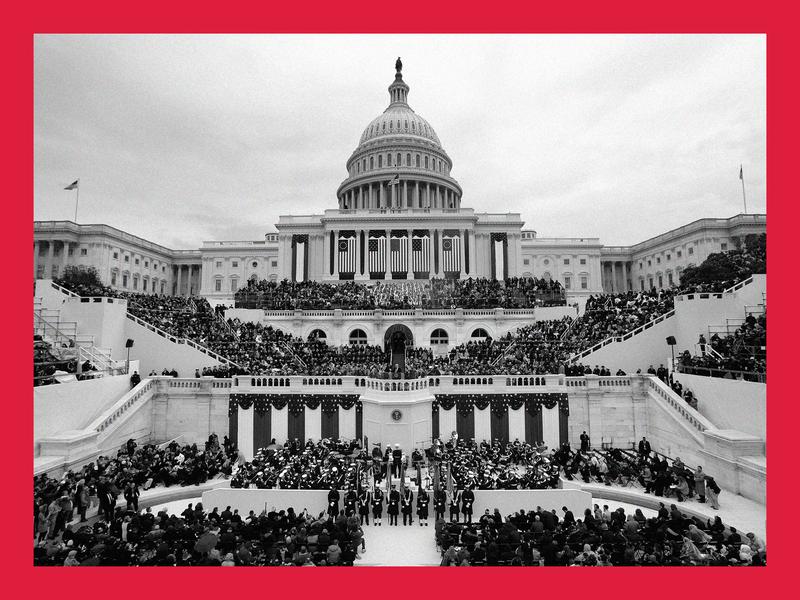AUDIE CORNISH: The company founded by the man in charge of Donald Trump's inauguration had a plan to capitalize on its connections in Trump's Washington, according to a confidential memo obtained by WNYC and ProPublica.
The memo outlines how Colony Capital — which is now led by Tom Barrack, an investor and long-time Trump friend who chaired the inaugural committee — aimed to exploit his connections to the new President.
This disclosure comes as federal prosecutors are conducting a wide ranging probe into the nonprofit that ran the festivities. WNYC’s Ilya Marritz broke the story with ProPublica's Justin Elliot. They're both part of the team that makes the podcast Trump, Inc., and Ilya joins me now. Hey, Ilya.
ILYA MARRITZ: How are you doing?
CORNISH: So what is this memo and what does it tell us?
MARRITZ: It is an eight-page strategy document on company letterhead. And it talks about all the ways that this huge private equity company, Colony — with billions of dollars under management — can make money from its relationships in Washington and around the world. Colony's founder is Tom Barrack. He was an early supporter of Donald Trump and Trump, after the election, asked him to be chair of his inaugural committee.
So, Inauguration Day comes: January 20th, 2017. It brings in lots of rich people from around the country, quite a few foreign donors. The following month, this strategic plan is written, and it outlines how Colony should set up a D.C. office. They talk about convening international ambassadors with members of the Trump administration.
Here's a quote, “The key to strategically — the key is to strategically cultivate domestic and international relations while avoiding any appearance of lobbying.” Here's another one: “No other firms,” it says, quote, “can currently match the relationships or resources that we possess.” So they saw infrastructure in particular as a ripe area for investment.
CORNISH: Alright, so did any of this happen?
MARRITZ: A Colony’s spokesman said this, quote, “This memo was simply an outline of a proposed potential business plan, which was never acted upon or implemented. Colony at no time has maintained a D.C. office,” and that is true. And Trump's infrastructure plans have not gone for — far.
But we found evidence that, early in the Trump administration, Colony was trying to mix its business with its government connections.
Here's one example: April 14th, 2017, Treasury Secretary Steven Mnuchin had dinner in a private room at a Georgetown restaurant. It included ambassadors from Oman, Kuwait, Jordan, the United Arab Emirates, Bahrain, Qatar, Saudi Arabia. Also at the dinner: Tom Barrack, chairman of Colony Capital. Also there: Rick Gates, who had worked on the inauguration and went on to do work for Colony.
By the way, Gates has since pleaded guilty to conspiracy in the Mueller probe — unrelated to this, as far as we know — and he's cooperating with prosecutors. Barrack also got involved around this time in an effort to bring American nuclear technology to Saudi Arabia. That, uh, also stalled.
CORNISH: What do these international connections tell us?
MARRITZ: Tom Barrack is someone who's been doing business in the Middle East for decades. He's of Lebanese descent. He speaks Arabic.
But we obtained one more document that really sheds light on these international connections. It's an invitation list to an — uh, an event called the Chairman's Global Dinner. This happened during Inauguration Week. It was a closed-door, high-gloss event. The melan— Mellon Auditorium in Washington. Donald Trump spoke there, the entire diplomatic corps was invited, and Tom Barrack had his own guest list — over a hundred people. Uh, they — his guest list included an Emirati property developer, there were ambassadors from Persian Gulf nations to Washington.
There hadn't been in a Chairman's Global Dinner like this at previous inaugurations. Seems like an event that really put Tom Barrack's clout and influence on display for people who mattered in Trump's Washington.
CORNISH: Of course, Tom Barrack was the chairman of the dinner, right? Okay, explain — and, and the company — explain how this fits in with the subpoena, Ilya, that New York prosecutors just served to the inaugural committee.
MARRITZ: Right. So, Tom Barrack was the chairman of the committee. It is his lawyers who are now responding to the subpoena. [CORNISH HUMS IN UNDERSTANDING] We know a little bit about what prosecutors think they may find. They're looking for evidence of illegal foreign contributions. Those are banned by law. They think they may find some kind of cash-for-access arrangements.
Remember, this inaugural committee blew all the other inaugural committees out of the water when it came to fundraising.
CORNISH: Right.
MARRITZ: Over $100 million, they brought in —
CORNISH: Right.
MARRITZ: — it was a popular ticket with some donors. Increasingly, with this subpoena, and this probe, there will be questions aimed at Tom Barrack as the man in charge. A spokesperson says the committee is cooperating.
CORNISH: Yeah, lots of money, not so many people. Where do people go if they want to learn more?
MARRITZ: Go to our website, TrumpIncPodcast.org.
CORNISH: Alright. You will stay on the story. That's WNYC’s Ilya Marritz, cohost of our Trump, Inc. podcast, pro— produced with ProPublica. Thank you, Ilya.
MARRITZ: You’re very welcome.
Copyright © 2019 ProPublica and New York Public Radio. All rights reserved. Visit our website terms of use at www.wnyc.org for further information.
New York Public Radio transcripts are created on a rush deadline, often by contractors. This text may not be in its final form and may be updated or revised in the future. Accuracy and availability may vary. The authoritative record of New York Public Radio’s programming is the audio record.

